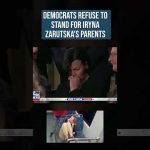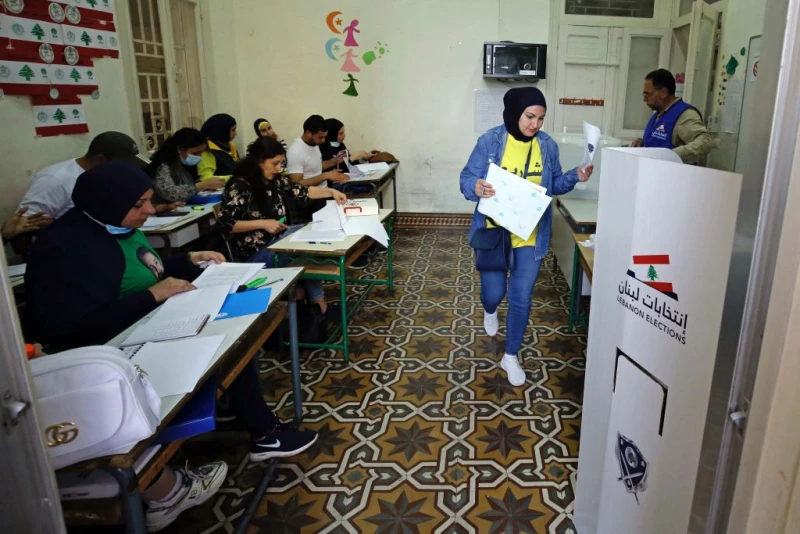
A voter casts a ballot in the parliamentary election at a polling station in the northern Lebanese city of Tripoli on May 15, 2022. / Credit: IBRAHIM CHALHOUB/AFP via Getty Images
ACI MENA, Oct 9, 2025 / 08:12 am (CNA).
Lebanon’s diaspora has long been celebrated as the country’s greatest strength, yet when it comes to voting rights their role remains a source of division and unease.
The most recent cabinet sessions have brought the matter back into sharp focus, underscoring both the fragility of political consensus and the mistrust that continues to paralyze reform. For many Christians, the matter carries a particular weight. Behind the technical arguments lies a deeper fear: that limiting the diaspora’s voice is less about electoral procedure and more about gradually eroding their influence in Lebanon’s fragile balance of power.
Flying home, voting overseas
The right for Lebanese to vote abroad in national elections was first introduced in the 2017 electoral law. Before then, anyone living outside Lebanon had to fly home if they wanted to cast a ballot.
The new law allowed expats to vote from abroad through embassies and consulates. It also created a plan to set aside six seats in Parliament specifically for expat voters: one for each of Lebanon’s major religious communities (Maronite, Greek Orthodox, Greek Catholic, Sunni, Shiite, and Druze).
Under that plan, expats would not vote for all 128 members of Parliament (MPs) like residents do but only for six deputies chosen in newly created overseas districts divided by continent.
However, no such constituency was established. The law itself left the mechanism vague, with no clear way to implement it.
As a result, in both the 2018 and 2022 elections, Lebanese abroad voted for the full 128 members of Parliament, just like citizens inside the country. Their votes counted in their original home districts, not in a separate “expat-only” bloc.
Hezbollah pushes to limit diaspora vote
With the next elections set for 2026, there is growing pressure — led mainly by Hezbollah and its allies — to finally activate the six-seat plan and confine diaspora voters to it.
On the other side, 68 members of Parliament (MPs), representing more than half the chamber — from parties including the Lebanese Forces, Kataeb, the Progressive Socialist Party (PSP), independents, and others — are pushing to amend the law and make the district-based system permanent.
Yet Speaker Nabih Berri has so far refused to put their proposal on Parliament’s agenda, leaving the issue unresolved.
Two recent sessions highlighted the deadlock. On Monday, Berri refused to put the amendment on the agenda, prompting Lebanese Forces and Kataeb MPs — the country’s two main Christian parties — to walk out and break quorum. The next day’s session collapsed for the same reason, as boycotts continued.
Hezbollah and its allies have the most to lose from an empowered diaspora, and the numbers from 2022 explain why. Nearly 130,000 Lebanese abroad turned out to vote, triple the figure from 2018, and many of their ballots went to independents and reformists openly critical of Hezbollah’s role in the country.
Amal-Hezbollah’s share of the expatriate vote slid from 20% to 13%, while the Free Patriotic Movement — Hezbollah’s main Christian partner — sank from 16% to 7%.
What unsettles the establishment even more is that these voters are not detached migrants but recent emigrants who fled the financial collapse in 2019 and the Beirut port blast in 2020 — a younger electorate with little patience for the old order. With projections that up to 300,000 expats could register in 2026, Hezbollah sees the diaspora not as a distant constituency but as a looming electoral threat, one it hopes to contain through the six-seat plan.
Logistical excuses or political pretexts?
Hezbollah, for its part, does not openly admit that the push for six seats is about limiting the diaspora’s influence. Instead, its leaders frame the issue around “logistical difficulties,” challenges in monitoring voting abroad, and the risk that expatriates could face pressure.
But in an interview with ACI MENA, CNA’s Arabic-language news partner, MP Pierre Bou Assi rejected those claims outright. “These arguments are entirely unfounded,” he said. “It is impossible to exert pressure on voters casting their ballots in privacy behind the curtain. From a logistical perspective, the process of voting for 128 MPs has already proven successful, while the feasibility of voting for only six MPs abroad is untested.”
He added that the diaspora itself has been vocal in demanding the right to vote for the full 128 seats and that support for this demand cuts across Lebanon’s political and sectarian lines.
“Undoubtedly, restricting the Christian vote to six MPs is a deliberate marginalization of Christian voices and a reduction of their political impact,” he said. “It is a weakening of true representation and a reduction of Christian participation in real political partnership and in national decision-making.”
According to the Interior Ministry’s latest voter rolls published in 2022, Christians make up about one-third of Lebanon’s electorate overall, similar to their share among residents inside the country. But among registered expatriates, Christians form a clear majority: 53.2%, compared with 20% Sunni, 20% Shiite, and 6.4% Druze.
Assi, who previously headed the Foreign Relations Department of the Lebanese Forces, stressed to ACI MENA that Lebanese abroad are not detached from their homeland. On the contrary, he said, they remain deeply attached to Lebanon and aspire to return or invest in it.
“The Lebanese abroad possess enormous resources — scientific, intellectual, financial — and their expertise spans many fields. What they ask for above all is stability. This is why, as the Lebanese Forces, we place stability as our highest priority, and the only path to that is by strengthening the state and ensuring that the monopoly over arms and the decision of war and peace rests solely in its hands.”
Assi underlined that the Christian presence and role in Lebanon is the community’s “very reason for being.” Once stability is secured, he argued, the diaspora will play a decisive role in Lebanon’s prosperity.
Young Christians abroad voice frustration
Lebanese abroad, especially Christians, are increasingly angry at the prospect of losing their full voting rights. Charbel Abi Younes, a 27-year-old political scientist who left for Australia in 2022, said he feels “excluded from the politics of my own country.” If the law confines diaspora voters to six seats, he added, he will not cast a ballot: “It would feel like my own country telling me that I am not a part of it.”
Younes described the push for restrictions as “an attempt by specific sides at consolidating power because they are aware that the immigrant vote would topple them.”
Reflecting on the wider role of the diaspora for Lebanon’s Christians, he noted: “The Christians of Lebanon have had to rely heavily on the diaspora over the past few years, be it economically through money from overseas or politically through lobbying. I hope one day the Christian community in Lebanon will be strong enough to not need anyone’s help but its own.”
This story was first published by ACI MENA, CNA’s Arabic-language news partner, and has been translated for and adapted by CNA.















